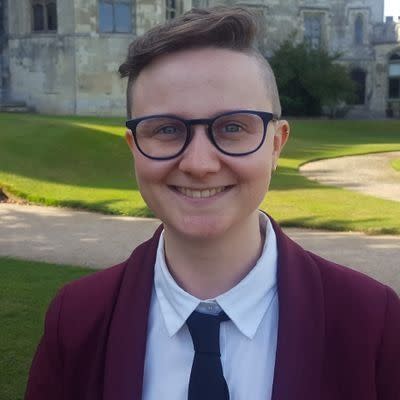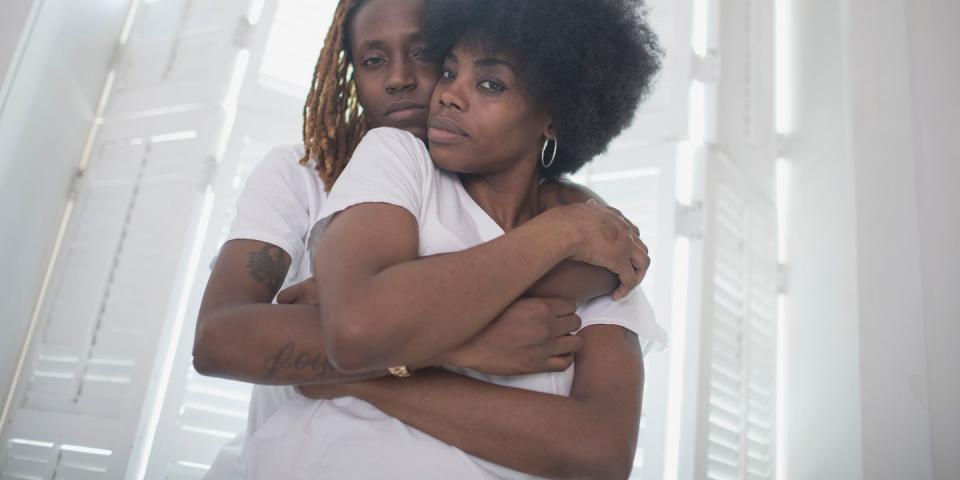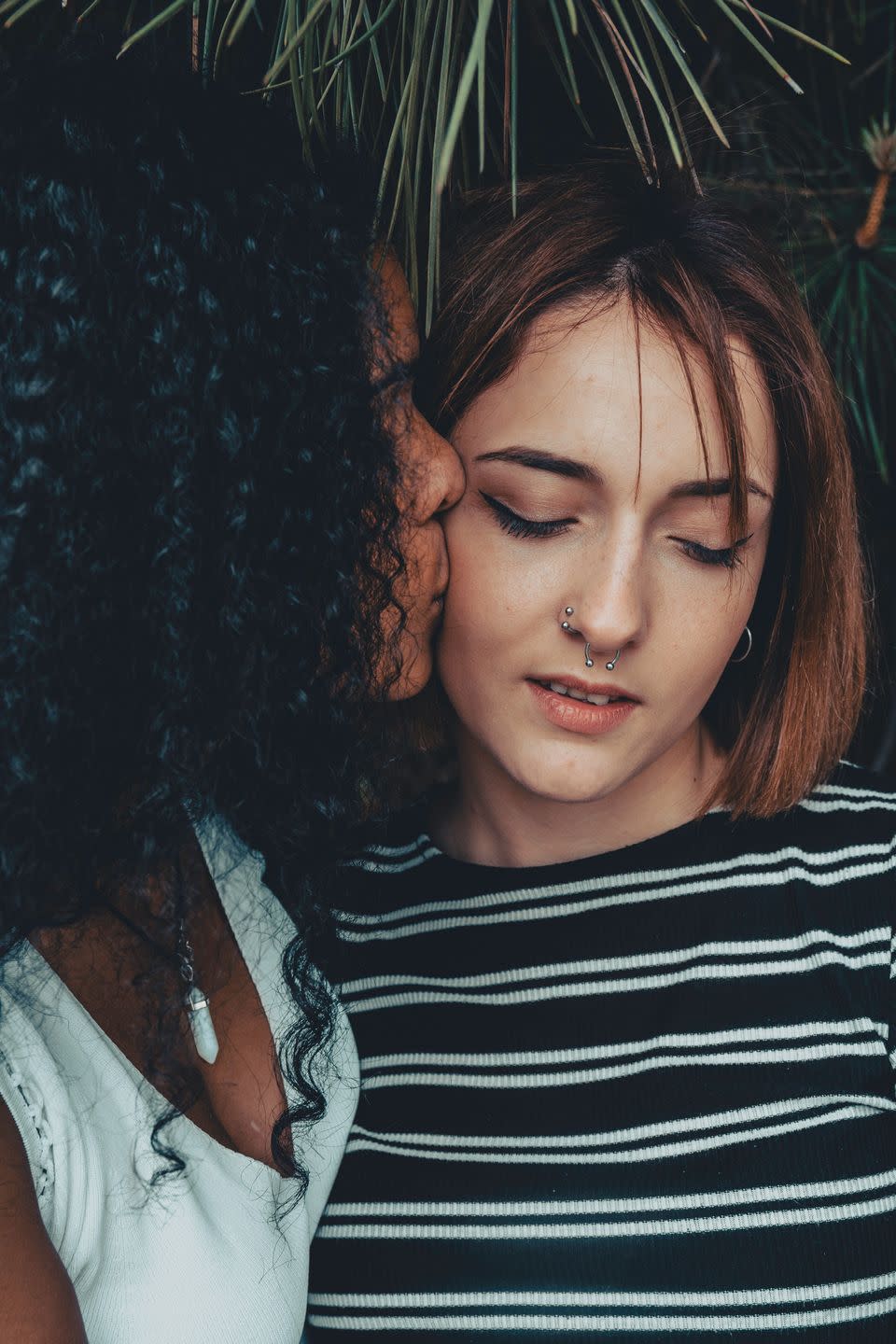Why are lesbians the most lonely of all LGBTQ+ identities?
Lockdown and the Coronavirus pandemic have been difficult for everyone, with so many people reporting feeling lonelier than ever. For LGBTQ+ people, who already experience disproportionate levels of loneliness, anxiety and depression, being stuck at home - either away from their chosen family and community, or with people who aren't accepting of their identities - the past year has been especially tough.
An independent study by Just Like Us, the charity for LGBT+ young people, has found that of all the identities under the LGBTQ+ umbrella, lesbians are the most likely to report feeling lonely. Almost 9 in 10 (87 per cent) of lesbians felt this way, and also reported feeling separated from the people they are closest to on a daily basis since the pandemic began. This was compared to 46 per cent of gay boys, 54 per cent of young bisexual people and 52 per cent of young transgender people who have felt lonely and separated on a daily basis.
Just Like Us surveyed 2,934 secondary school pupils (1,140 of whom were LGBTQ+) and found that 55 per cent of LGBTQ+ 11 to 18 year olds are worried about their mental health on a daily basis, compared to just 26 per cent of their non-LGBTQ+ peers.

So why are lesbians experiencing loneliness and feelings of separation at a higher rate than people of other LGBTQ+ identities? And why do they report their mental health getting worse (78 per cent) more frequently than gay boys (71 per cent), bisexual people (74 per cent) and trans people (70 per cent)?
The word lesbian is still taboo
"Generally, I think lesbians are very overlooked. If this new research surprises you, then it shows us how much the media and wider society is out of touch with the experiences of lesbians growing up and living in the UK," says Amy Ashenden, Head of Comms and Media at Just Like Us.
"I’m not at all surprised that, on the whole, young lesbians are struggling significantly more than young gay boys. Even the word lesbian is still a taboo – it’s seen as something awkward, shameful, or even embarrassing or cringeworthy. I think probably almost all young lesbians internalise this to some degree, which takes a lot of unpicking in later life. There’s a lot of conversations in society generally about the impact of gay shame, but never really about lesbophobia or what lesbians go through."
Although she is not surprised by the findings, Amy says it's sad to see how lonely young lesbians are and how little has changed. "I hope that schools and families will do more to send positive messages to young lesbians who are struggling so much – including trans lesbians and Black lesbians who face even more mental health challenges."
Low visibility and misrepresentation
Amy also points to the lack of visibility in the media and wider society. "We’re either fetishised, disregarded as not worthy or perhaps even as old fashioned, or very, very wrongly dismissed as anti-trans," she explains. "I don’t think any other group under the umbrella has been dismissed as anti-trans in the same way so many of us who are lesbian have been and continued to be suspected to be – despite that fact that lesbians actually have a lot in common with the experiences of trans people, and you can also be trans and lesbian.

"Not only is the anti-trans hostility in the media extremely damaging for young trans people, the ways the media has sometimes pointed fingers at the lesbian community as if transphobia has a direct correlation is also incredibly damaging for young lesbians and their mental health. I know that for me, and other lesbian friends, that rhetoric seems absurd, frustrating and doesn’t help our general wellbeing."
Homophobia and sexism
Lesbians face both homophobia and sexism. Amy says, "Growing up that might look like pressure to date boys or distance yourself from anything lesbian, particularly the word lesbian – unless of course you can brush it off as being only for male attention. At any age, and particularly for me as a butch lesbian, it can look like stepping outside and men immediately glaring at you, shouting ‘dyke’ at you and generally being very aggressive because you’re gender-non-conforming."
Lack of safe lesbian spaces
As Amy points out, even pre-COVID, lesbians struggled to have safe spaces and community networks. "Most are catered to men," she adds. "As a lesbian, I’ve often found straight women feel uncomfortable or awkward around lesbians or even using the word lesbian, which is vastly different to the way they stereotypically embrace gay men. That can be very alienating, especially growing up, and adds to the horrible idea that being a lesbian is somehow wrong or disgusting or shameful."

Lack of positive messaging
Just Like Us’ research also found that the majority of secondary school pupils have had "little to zero" positive messaging about being LGBTQ+ in the last year. "It’s vital that young people, especially those who are struggling with mental health and may be living with unaccepting families, know that school is a safe place and that their teachers will accept them."
"It’s uncomfortable not being able to fully be myself in lockdown"
Maya*, who says she accepted she was a lesbian at 17 and it was "the most liberating thing [she's] ever done," has been living with her family - who she is not out to - during lockdown.
"It’s uncomfortable not being able to fully be myself; I feel like there’s a small piece of me closed off in what’s otherwise a safe space for me," she explains. "The other day I was FaceTiming a friend of mine who’s also a lesbian. I panicked when she started talking about her girlfriend and other LGBTQ+ topics, quickly plugged in my headphones and went downstairs, away from my family. When we were talking about anything to do with girls or crushes I lowered my voice practically to a whisper."

Maya says her family is not homophobic, and that she hasn't come out to them because she is a private person and hasn't had a serious relationship so the topic hasn't come up. "Yet I still feel the need to somewhat hide my sexual orientation because of the assumption of heterosexuality as the norm and being gay as something 'different' that needs to be revealed," she adds.
"Society teaches us that being a lesbian is bad, disgusting and abnormal. Whether it’s kids throwing around slurs, media that depicts lesbianism negatively, or even teachers and parents who are homophobic, we develop negative connotations surrounding female homosexuality. In turn, when lesbians grow up and come to terms with our sexual orientation, we begin to view ourselves as inherently bad. Self-hatred and shame clearly lead to poor mental health. Even if our school, uni or workplace has a zero tolerance bullying policy, or our classmates mature, these formative experiences are hard to shake."
"A lesbian identity is an inherently lonely one," Maya says. "In most social environments there’s an assumption that everyone is straight - which is fine, most people are - but when you’re surrounded by straight girls asking you if you have a boyfriend and straight men asking you on a date, it can feel really isolating, regardless if you’re out or not. There’s this feeling of marked difference that you can’t escape. If, like me, you’re not out to the people you live with, this isolation has increased during the pandemic. You’re not physically in school or uni, which might be the only place you feel like you can authentically be yourself."
In tackling the loneliness experienced by lesbians, Maya says she thinks the most important thing is the normalisation of the lesbian identity. "Treat your lesbian friends and relatives the same way you treat straight people. Don’t be afraid to ask them about their dating life, for instance, if that’s something you would ask about if they were straight. I don’t think we need special treatment, just a reminder that we don’t have to face our struggles alone."
*Name has been changed
SUBSCRIBE HERE to have Cosmopolitan delivered to your door.
Like this article? Sign up to our newsletter to get more articles like this delivered straight to your inbox.
You Might Also Like

